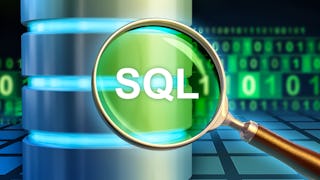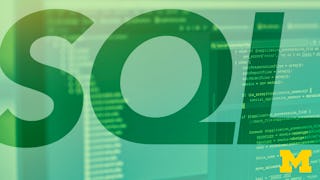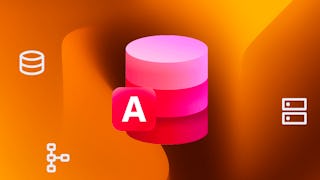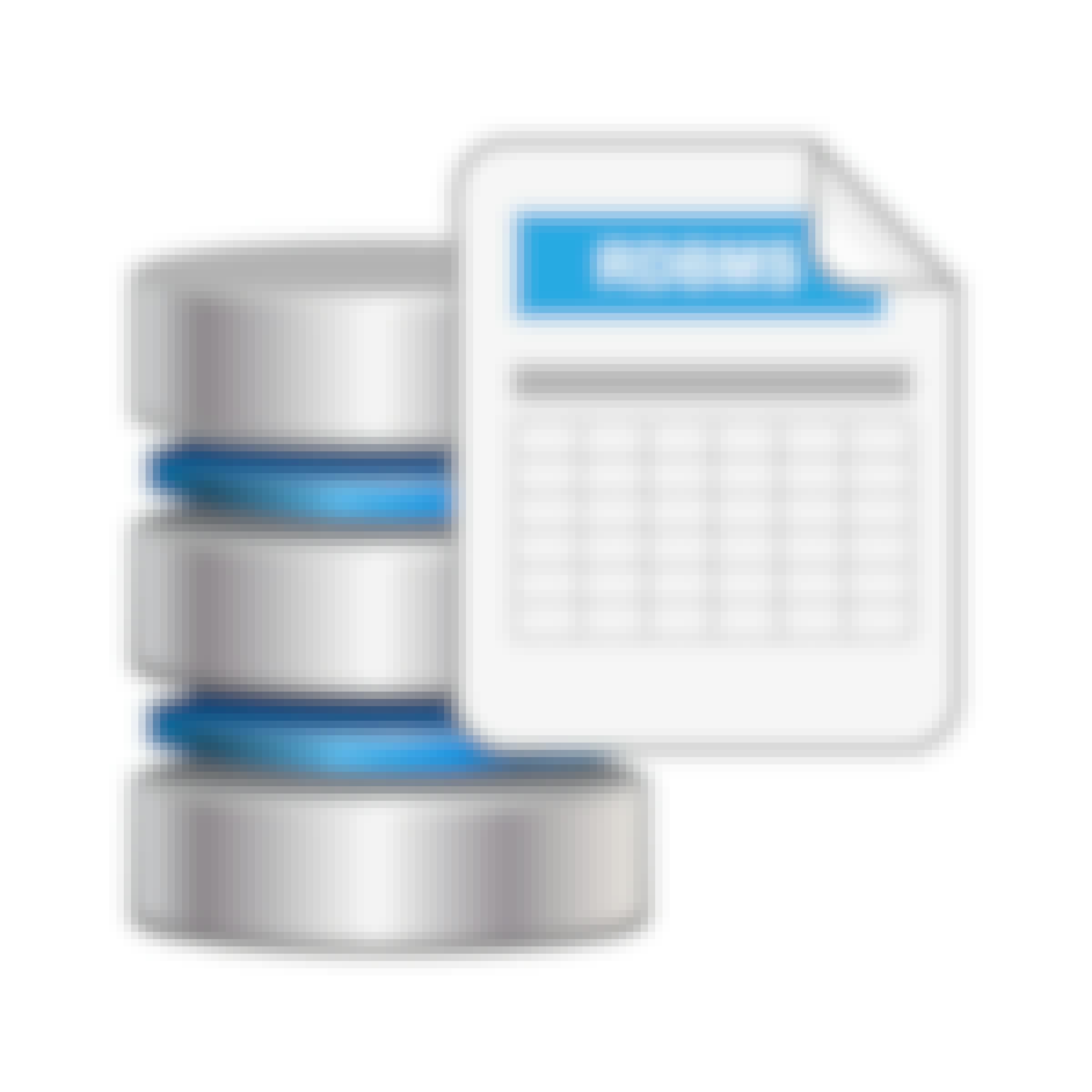- Browse
- Mysql
MySQL Courses
MySQL courses can help you learn database design, data querying, and transaction management. You can build skills in writing complex SQL queries, optimizing database performance, and ensuring data integrity. Many courses introduce tools such as MySQL Workbench and phpMyAdmin, that support managing databases and visualizing data structures. You'll also explore key topics like indexing, normalization, and data security, equipping you with practical knowledge to handle real-world database challenges.
Popular MySQL Courses and Certifications
 Status: Free TrialFree Trial
Status: Free TrialFree TrialSkills you'll gain: MySQL, Database Management, Stored Procedure, Database Design, Database Systems, Relational Databases, SQL, Database Development, Database Administration, Query Languages, Data Management, Data Integrity, Data Validation
4.8·Rating, 4.8 out of 5 stars559 reviewsBeginner · Course · 1 - 4 Weeks
 Status: Free TrialFree Trial
Status: Free TrialFree TrialSkills you'll gain: SQL, Relational Databases, Stored Procedure, Databases, Query Languages, Jupyter, Data Manipulation, Data Analysis, Pandas (Python Package), Transaction Processing, Python Programming
4.7·Rating, 4.7 out of 5 stars23K reviewsBeginner · Course · 1 - 3 Months
 Status: Free TrialFree Trial
Status: Free TrialFree TrialSkills you'll gain: SQL, Relational Databases, Microsoft SQL Servers, MySQL, Query Languages, Database Systems, Databases, Database Management, Stored Procedure, IBM DB2, Data Manipulation, Data Analysis, Transaction Processing
4.7·Rating, 4.7 out of 5 stars689 reviewsBeginner · Course · 1 - 3 Months
 Status: Free TrialFree TrialU
Status: Free TrialFree TrialUUniversity of Michigan
Skills you'll gain: Database Design, SQL, MySQL, Relational Databases, Databases, Data Modeling, Development Environment, PHP (Scripting Language), Software Installation
4.8·Rating, 4.8 out of 5 stars5.5K reviewsIntermediate · Course · 1 - 4 Weeks
 Status: Free TrialFree Trial
Status: Free TrialFree TrialSkills you'll gain: MySQL, Database Management, Stored Procedure, Database Development, SQL, Performance Tuning, Relational Databases, Query Languages, JSON, Data Analysis, Transaction Processing
4.7·Rating, 4.7 out of 5 stars248 reviewsIntermediate · Course · 1 - 4 Weeks
 Status: Free TrialFree TrialD
Status: Free TrialFree TrialDDuke University
Skills you'll gain: Predictive Modeling, Data Storytelling, Database Design, Dashboard, MySQL, Relational Databases, SQL, Tableau Software, Business Analytics, Business Metrics, Data Visualization Software, Analytics, Data Visualization, Business Process Improvement, Business Intelligence, Microsoft Excel, Business Analysis, Data Analysis, Big Data, Business Communication
4.6·Rating, 4.6 out of 5 stars15K reviewsBeginner · Specialization · 3 - 6 Months
What brings you to Coursera today?
 Status: Free TrialFree TrialM
Status: Free TrialFree TrialMMicrosoft
Skills you'll gain: Microsoft SQL Servers, SQL, Transact-SQL, Databases, Relational Databases, Data Transformation, Data Manipulation, Query Languages, Generative AI, Data Analysis
4.6·Rating, 4.6 out of 5 stars173 reviewsBeginner · Course · 1 - 4 Weeks
 Status: Free TrialFree Trial
Status: Free TrialFree TrialSkills you'll gain: Database Design, Database Management Systems, SQL, Relational Databases, Databases, MySQL, Database Administration, Data Integrity, Query Languages, Data Manipulation
4.7·Rating, 4.7 out of 5 stars1.4K reviewsBeginner · Course · 1 - 3 Months
 Status: Free TrialFree Trial
Status: Free TrialFree TrialSkills you'll gain: MySQL, Database Management, Database Administration, Data Warehousing, Linux Commands, Data Integrity, Unit Testing, Algorithms, Software Versioning, Command-Line Interface, Software Visualization, Linux, Pseudocode, Query Languages, Collaborative Software, Django (Web Framework), Database Architecture and Administration, Programming Principles, Computational Thinking, Test Driven Development (TDD)
4.6·Rating, 4.6 out of 5 stars7.6K reviewsBeginner · Professional Certificate · 3 - 6 Months
 Status: Free TrialFree TrialU
Status: Free TrialFree TrialUUniversity of Michigan
Skills you'll gain: Stored Procedure, NoSQL, Database Design, Database Architecture and Administration, SQL, Relational Databases, Cloud Applications, PostgreSQL, Database Management Systems, Data Store, Databases, Database Theory, Data Modeling, JSON, Database Management, Query Languages, Cloud Deployment, Text Mining, Database Systems, Natural Language Processing
4.7·Rating, 4.7 out of 5 stars1.4K reviewsIntermediate · Specialization · 3 - 6 Months
 Status: Free TrialFree Trial
Status: Free TrialFree TrialSkills you'll gain: Database Design, IBM DB2, Relational Databases, Databases, MySQL, Database Architecture and Administration, PostgreSQL, Database Management Systems, Data Management, SQL, Data Modeling, Data Manipulation, Data Import/Export, Data Integrity, Data Security, Command-Line Interface
4.6·Rating, 4.6 out of 5 stars778 reviewsBeginner · Course · 1 - 4 Weeks
 Status: NewNewStatus: Free TrialFree Trial
Status: NewNewStatus: Free TrialFree TrialSkills you'll gain: SQL, Database Management, Database Design, Database Architecture and Administration, Query Languages, Databases, Data Manipulation, Performance Tuning, Data Integrity
Beginner · Specialization · 1 - 3 Months
In summary, here are 10 of our most popular mysql courses
- Database Structures and Management with MySQL: Meta
- Databases and SQL for Data Science with Python: IBM
- SQL: A Practical Introduction for Querying Databases: IBM
- Introduction to Structured Query Language (SQL): University of Michigan
- Advanced MySQL Topics: Meta
- Excel to MySQL: Analytic Techniques for Business: Duke University
- SQL Foundations: Microsoft
- Introduction to Databases: Meta
- Meta Database Engineer: Meta
- PostgreSQL for Everybody: University of Michigan
Frequently Asked Questions about Mysql
MySQL is an open-source relational database management system (RDBMS) that uses Structured Query Language (SQL) for accessing and managing data. It is widely used for web applications and is a key component of many software stacks, including the popular LAMP stack (Linux, Apache, MySQL, PHP). MySQL is important because it allows organizations to store, retrieve, and manage large amounts of data efficiently, making it essential for data-driven decision-making and application development.
With skills in MySQL, you can pursue various job roles, including Database Administrator, Data Analyst, Software Developer, and Data Engineer. These positions often require proficiency in managing databases, writing complex queries, and ensuring data integrity. Additionally, many businesses seek professionals who can leverage MySQL for data analytics and business intelligence, making it a valuable skill in today's job market.
To learn MySQL effectively, you should focus on several key skills: understanding relational database concepts, mastering SQL syntax for querying and manipulating data, and learning how to design and manage databases. Familiarity with data modeling, indexing, and performance optimization techniques is also beneficial. Additionally, knowledge of data analytics can enhance your ability to extract insights from databases.
Some of the best online MySQL courses include the Database Structures and Management with MySQL course, which covers fundamental concepts and practical applications. The MySQL for Data Analytics and Business Intelligence course is also highly recommended for those looking to apply MySQL in data analysis contexts. For advanced learners, the Advanced MySQL Topics course offers deeper insights into complex database management.
Yes. You can start learning MySQL on Coursera for free in two ways:
- Preview the first module of many MySQL courses at no cost. This includes video lessons, readings, graded assignments, and Coursera Coach (where available).
- Start a 7-day free trial for Specializations or Coursera Plus. This gives you full access to all course content across eligible programs within the timeframe of your trial.
If you want to keep learning, earn a certificate in MySQL, or unlock full course access after the preview or trial, you can upgrade or apply for financial aid.
To learn MySQL, start by exploring online courses that provide structured learning paths. Begin with the basics of SQL and database design, then gradually move on to more advanced topics. Practice by working on real-world projects or using sample databases to reinforce your learning. Engaging with community forums and resources can also enhance your understanding and provide support as you progress.
Typical topics covered in MySQL courses include database design principles, SQL query writing, data manipulation techniques, and database administration. Courses often explore data types, indexing, normalization, and performance tuning. Additionally, you may learn about integrating MySQL with programming languages and using it for data analytics and reporting.
For training and upskilling employees, courses like Excel to MySQL: Analytic Techniques for Business Specialization can be particularly effective. This specialization combines Excel and MySQL skills, making it ideal for professionals looking to enhance their data analysis capabilities. Additionally, the Managing Big Data with MySQL course is beneficial for teams working with large datasets, providing essential skills for data management and analysis.










